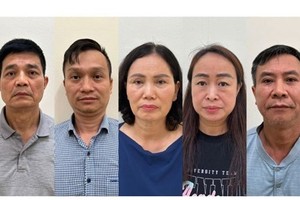 |
Major General Pham Cong Nguyen – Director of the Department of Legislation and Administrative, Judicial Reform (MPS) |
Director Pham Cong Nguyen first mentioned the new content in the draft Citizen ID Law compared to the 2014 Citizen ID Law. Firstly, besides Vietnamese citizens and relevant organizations, agencies, individuals, this new law will expand to more subjects like people of Vietnamese origin and living now in Vietnam but not yet determining the nationality.
The new Citizen ID Law integrates extra information of citizens and people of Vietnamese origin from other specialized databases into the National Population Database in order for ID card-related apps and e-ID card app to exploit to ensure the effectiveness of Project 06 by the Government.
Regarding the electronic citizen identity card (e-ID card), the Director said that this is one new important part. Current data on citizens’ ID cards are used to create their electronic identity and a corresponding e-ID account (in short, an e-ID card). Each citizen has only one such e-ID card, which is also his or her e-ID account established by the electronic identification and authentication system of the Ministry of Public Security.
This e-ID card is then used for online administrative procedures, public services, as well as other transactions by the card owner. This card has the same legal value as the hard version of citizen ID card in any transactions asking for the display of a citizen ID card or in times of checking personal information by competent agencies. At present, the electronic identification and authentication system is designed to accommodate 180 million visits a day into the app VNeID.
As regards measures of the Ministry of Public Security (MPS) to ensure security and convenience of integrated information in e-ID cards when exploiting it, Director Nguyen stated that all sensitive information on these e-ID cards is at top-priority of protection. The new Citizen ID Law clearly states that these cards and relevant information in the National Population Database must be managed in a safe way to ensure human and citizen rights. MPS must use specialized equipment to guarantee this data safety.
In addition, only assigned people are allowed to access personal data of citizens within the limit of their duty under the approval of data owners via fingerprint or face authentication steps, which is done directly on information reading devices or VNeID. Therefore, even if a citizen ID card is stolen, it is impossible for criminals to exploit existing data on the card. Meanwhile, the victim can still use information of the real ID card via his or her e-ID card.
Answering whether it is compulsory for people under 14 years old to register for one citizen ID card, the Director said that the new Citizen ID Law stipulates that a citizen ID card is issued to citizens under 14 years old, and an identity certificate to people of Vietnamese origin in order to ensure their legal rights as well as to serve state management purposes in the models of digital government and society. However, this issuance for those under 14 years old is optional and from 14 years old mandatory.
As to the necessity to renew a citizen ID card when there is a change of place of residence, he answered that this is also optional in accordance with the needs of citizens. Moreover, any citizen ID cards issued before the effective date of the new Citizen ID Law are still valid until their expiration. A new version of this card is given to any person requesting it. Other legal documents using information from the old format of the citizen ID card still have legal validity.
Finally, Director Nguyen assured that new information appearing on the new version of a citizen ID card will not have any negative effects on card owners when carrying out administrative procedures. Article 19 of the new Law stipulates the elimination of fingerprints on the card; the lines ‘Citizen Identity Card’, ‘Place of Origin’, Place of Residence’, ‘Signature of Card Issuer’ are replaced with ‘Identity Card’, ‘Place of Birth Registration’, ‘Place of Accommodation’, and ‘Issued by: Ministry of Public Security’.
This change is expected to give more convenience to citizens when using the card and ensure their privacy. Basic information of card owners is stored and exploited via the chip installed onto the card. The adjustment of place of residence into place of accommodation is to guarantee that all Vietnamese citizens are eligible for obtaining an ID card.
Currently used citizen ID cards are still legally valid, while card renewal for the change of place of accommodation is per request of card owners. When it is not yet possible to update to a new card for information change, citizens can adjust data in their e-ID card (free in VNeID app) to proceed with administrative procedures, business and civil transactions.
























